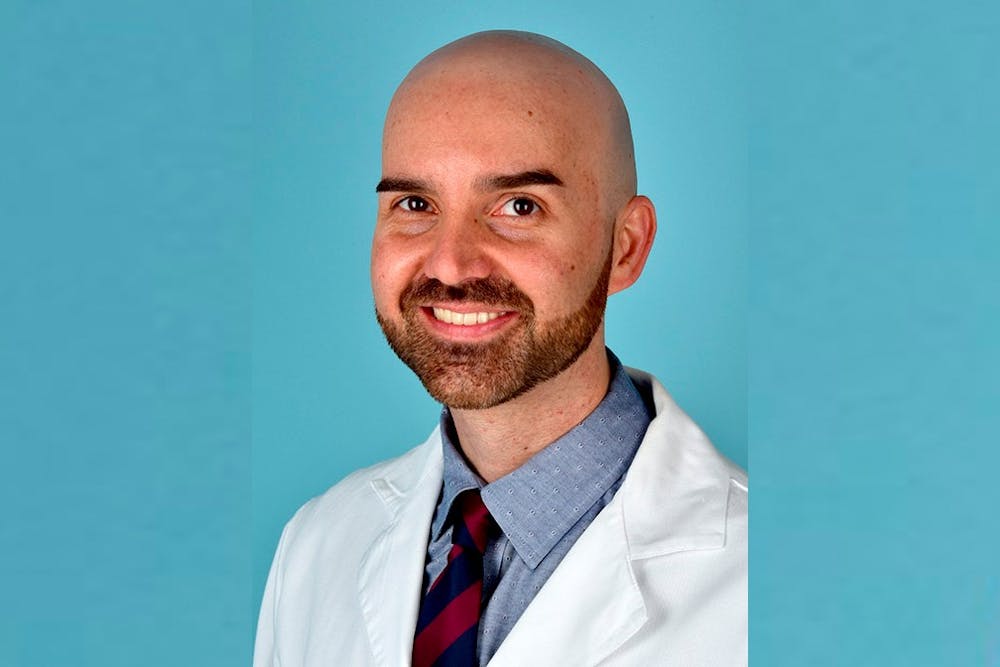The American Academy of Dermatology honored Penn Med physician Cory Simpson as a national "Patient Care Hero" for providing uninsured immigrants in Philadelphia free dermatologic treatment.
Simpson works with Puentes de Salud (Bridges to Health), a non-profit Philadelphia community health clinic, to serve patients who may experience cultural, language, economic, or legal barriers to medical care. Simpson said he uses teledermatology, which allows dermatologists to treat patients remotely through a smartphone app called AccessDerm. Puentes de Salud physicians take photos of the skin condition and send a brief patient history to Penn dermatologist volunteers, he added.
“Usually within a day, we’ll turn it back around to [Puentes de Salud physicians] and give them some advice,” Simpson said.
A study led by Simpson, third-year Penn Med student Alexis Holmes, and 2013 College graduate and 2018 Penn Med graduate Peter Chansky found that the AccessDerm app significantly decreased wait times for Puentes de Salud patients attempting to receive dermatologic care in 131 cases.
“The mean wait time was 37 hours through the app, as opposed to 14 days through an appointment,” Holmes said. “With reduced wait time, we could triage patients so those with more serious skin problems could be treated first,” she added.
Holmes said that she believes using effective dermatologist-proposed plans could change medicine prescriptions, avoid emergency visits, and reduce inappropriate healthcare costs.
“If you go [to Puentes de Salud], you can’t just write someone a prescription for some really expensive drug, because they’ll just go to the pharmacy and see that there’s no way they can afford it,” Simpson said.
Simpson said he became involved with this clinic when he was a second-year medical resident at Penn Med and assumed the coordinator position at Puentes de Salud in 2015, where he addresses logistics and scheduling.
RELATED:
Penn Medicine to launch partnership with the Philadelphia Flyers and Wells Fargo Center
Penn Medicine study helps to identify patients in need of end-of-life conversations
Simpson said his team of doctors and medical residents receive about a dozen cases each month through the app and sees a third of these cases on a monthly visit to the clinic.
Simpson recalled one case where Simpson's team performed a biopsy in the clinic on a male patient who likely had a skin cancer on his face.
"This person wouldn’t have any other means to get the cancer removed if they hadn’t had access to the Puentes clinic and to our speciality in particular,” Simpson said.
Simpson said another goal of the outreach program with Puentes de Salud is to increase awareness among underserved and minority populations about the risk of skin cancer and the importance of being treated in a timely manner.
“Dermatologic conditions affect people of all walks of life, regardless of age, gender, race, ethnicity, nationality, or insurance status,” George Hruza, president of the American Academy of Dermatology, told NewsWise. “Dermatologists like Dr. Simpson and his colleagues at Puentes de Salud are integral partners in care, providing critical diagnoses and treatment for underserved communities in Philadelphia."
Erika Holzbaur, physiology professor and principal investigator of the Holzbaur Lab where Simpson works as a dermatology fellow, applauded Simpson's work at the clinic and added that Penn physicians are excited about the future of medicine through app-based diagnoses.









